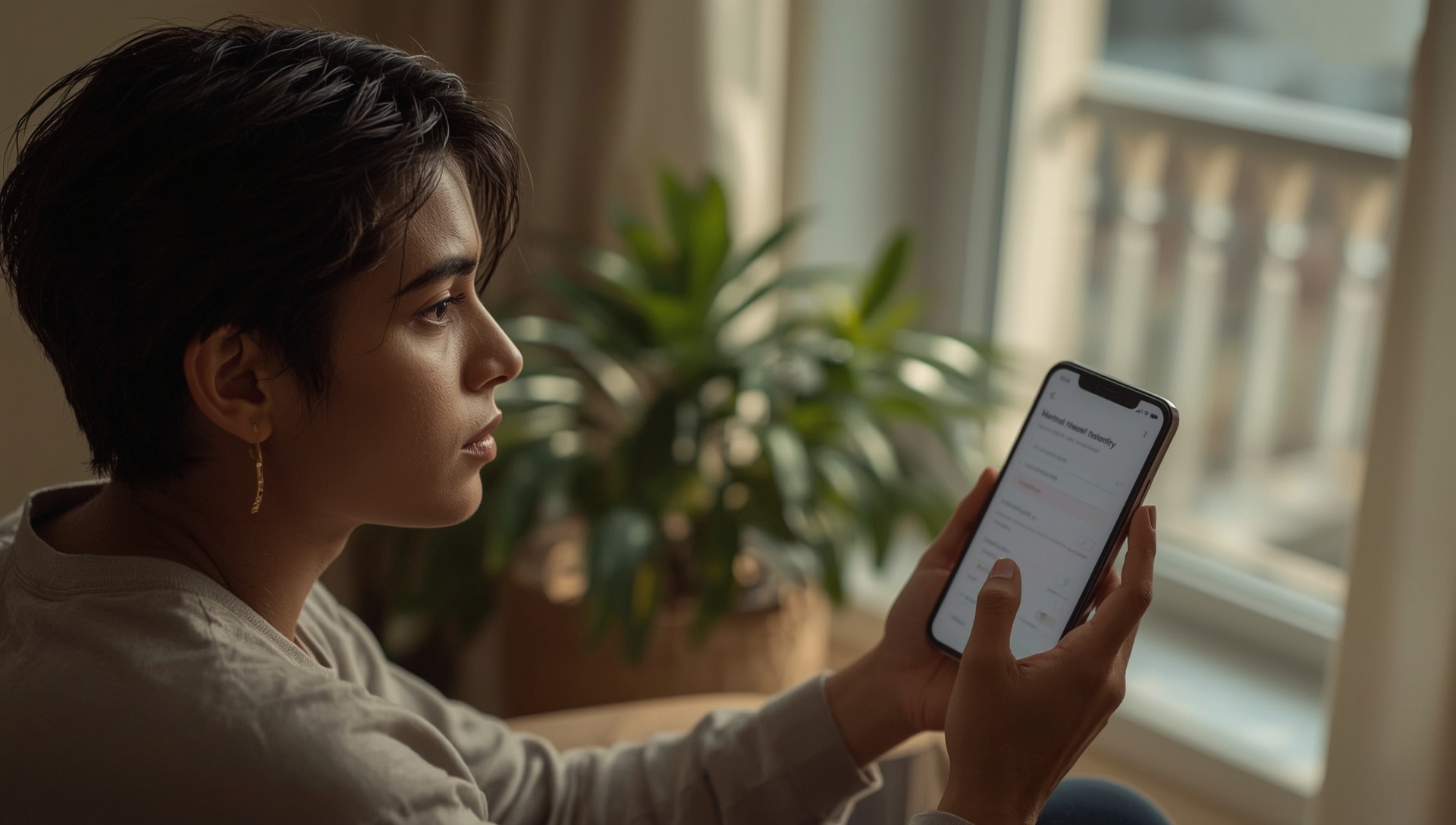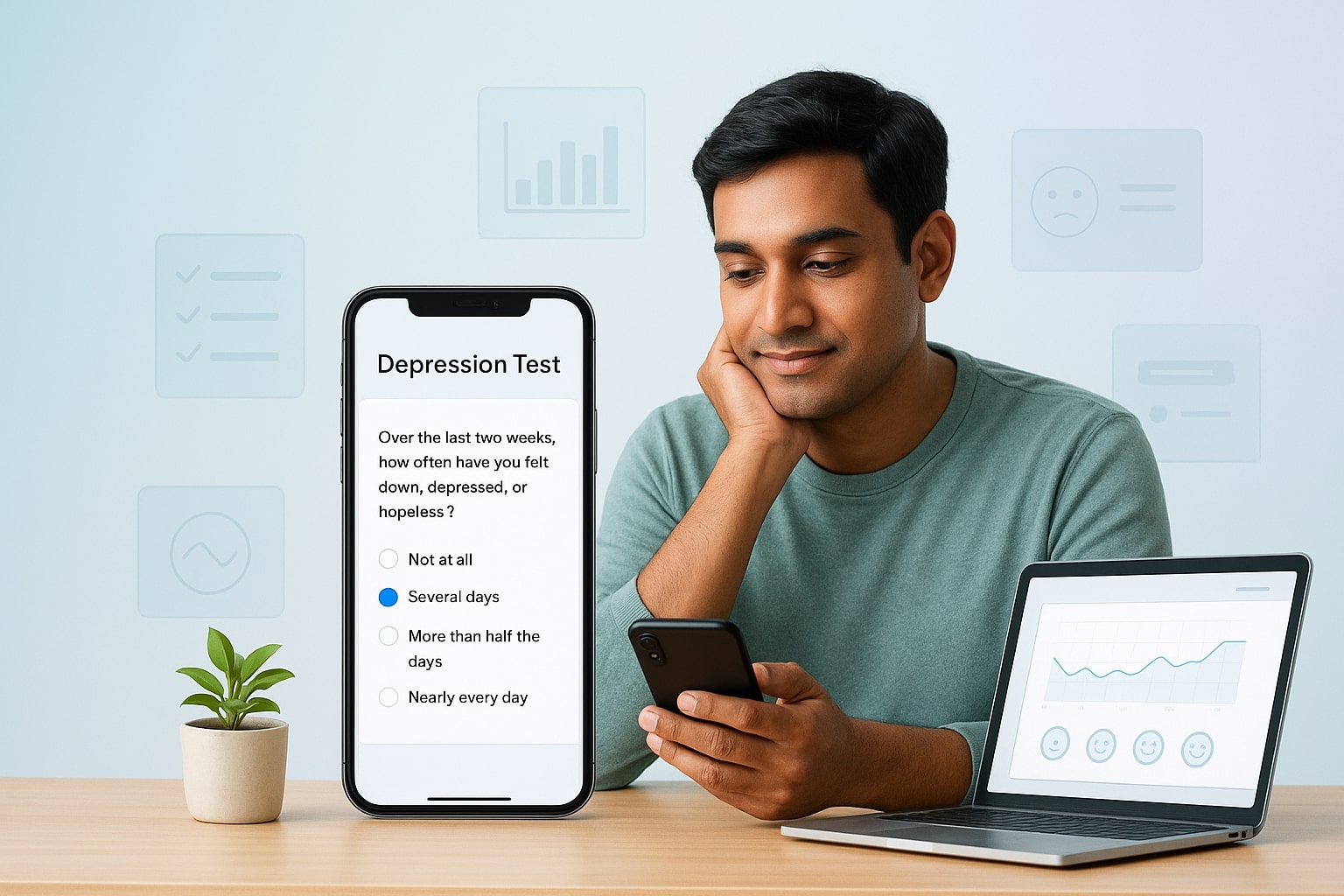
Amaha / / / Using Online Depression Tests and Quizzes to keeping Track of your Mental Health
ARTICLE | 4 MINS READ
Using Online Depression Tests and Quizzes to keeping Track of your Mental Health
Published on
25th Aug 2025

Dr Anuradha Kabra
MD Psychiatry

Nearly 280 million people worldwide live with depression, yet most of them go years without realising they have it. In India alone, over 56 million people experience depressive episodes, but only 25% ever seek help because they simply don't recognise the signs. Why? Stigma, lack of awareness, or sometimes just confusion about what depression really is.
As Amaha’s in-house psychiatrist Dr. Vani Kulhalli once told me, “People often know something feels off, but they don’t have a name for it until much later. Depression often disguises itself as laziness, moodiness, or stress in our society."
People dismiss their symptoms as 'just being weak' when actually, they're dealing with a legitimate medical condition that needs attention."
That’s where simple tools like a free online depression test come into the picture. These aren’t replacements for therapy, but they act like a mirror. A starting point. Almost like checking your temperature before deciding if you need a doctor. An online depression test can give you perspective when you’re not sure if your low mood is just stress or something deeper.

Is it more than just sadness?
Take the Depression Self-Assessment to understand the severity of your symptoms
Why Taking an Online Depression Test is a Great Idea
You know what's brilliant about online depression tests? They're accessible, private, and available 24/7. No awkward conversations with relatives asking why you're visiting a doctor, no waiting rooms filled with curious neighbours.
A depression test online serves as your first checkpoint. These non-clinical depression tests use scientifically validated questionnaires like the PHQ-9 (Patient Health Questionnaire) or Beck Depression Inventory to assess your symptoms objectively.
But here's the caveat, they're not diagnostic tools. Think of them as a thermometer for your mental health. Just like a fever indicates something's wrong but doesn't tell you exactly what, these tests flag potential concerns that need professional attention.
So when you take a depression test quiz, you’re not just answering random questions. You’re giving shape to feelings that otherwise sit quietly in the background.
10 Early Warning Signs of Depression
Recognising depression early can be tricky because it often creeps in slowly. Here's what to watch for:
Physical symptoms that seem random:
- Constant fatigue even after sleeping 8-10 hours
- Unexplained aches and pains
- Changes in appetite (either eating too much or too little)
- Sleep disturbances
Emotional red flags:
- Persistent sadness lasting more than two weeks
- Loss of interest in activities you once enjoyed
- Feeling worthless or excessively guilty
- Difficulty concentrating on simple tasks
Behavioural changes:
- Withdrawing from friends and family
- Neglecting personal hygiene or responsibilities
Some signs need immediate attention:
- Thoughts of self-harm or suicide
- Complete inability to function at work or home
- Substance abuse as a coping mechanism
- Severe isolation lasting weeks
Sometimes depression in Indian families gets dismissed as "just stress from work" or "marriage problems." But when these signs persist, it's worth taking a scientific test for depression.

Everyday Depression Tests and Checks So That You Can Track Your Mood and Mental Health
Creating an everyday life depression test routine doesn't require fancy apps or expensive tools. Here's what works:
1. Daily mood tracking:
Rate your mood from 1-10 each evening. Notice repeating patterns: are Mondays consistently worse? Do family gatherings drain you?
2. Sleep tracking:
Are you struggling to fall asleep even when you’re tired? Or waking up too early? Disrupted sleep for more than 10–14 days is often linked with depression.
3. Interest check:
Make a list of five activities you usually enjoy—like listening to music, cooking, chatting with friends. If none of them feels enjoyable for weeks, it’s a red flag.
4. Energy scan:
Do you feel drained doing small tasks like brushing, bathing, or replying to texts? That’s another everyday test for depression symptoms.
5. Social interaction monitor:
How often are you declining invitations or avoiding calls? Social withdrawal is a major red flag.
6. Thought log:
Write down your inner dialogue for a few days. If you notice frequent self-criticism, guilt, or hopelessness, it’s worth considering an online depression test free to confirm.
The am I depressed test question becomes clearer when you track these patterns over 2-3 weeks rather than relying on how you feel in a single moment.
These aren’t clinical methods, but they help you keep a finger on your emotional pulse. If the patterns stick around for longer than two weeks, that’s when taking an am I depressed test or a scientific screening like PHQ-9 makes sense.
5-min Free Depression Test and Quiz: Quick Self-Assessment
Ask yourself these questions honestly:
- Have you felt down, depressed, or hopeless for most days in the past two weeks?
- Have you lost interest in activities you usually enjoy?
- Are you sleeping too much or too little?
- Do you feel tired or have little energy most days?
- Have you been eating significantly more or less than usual?
- Do you feel bad about yourself or like you're a failure?
If you answered 'yes' to three or more questions, consider taking speaking with a healthcare professional.
How Therapy Actually Helps with Depression
"But I can talk to my friends or family, why do I need a therapist?" This is probably the most common question in India about mental health treatment.
Here's the difference: friends offer sympathy, reputable and licensed therapists provide strategy. A trained therapist helps you identify negative thought patterns that fuel depression, teaches coping mechanisms, and guides you through evidence-based techniques like Cognitive Behavioural Therapy (CBT) or Interpersonal Therapy.
Therapy works by literally rewiring your brain. Through consistent practice of new thought patterns and behaviours, you create fresh neural pathways. It's like building new roads in your mind that bypass the traffic jams of depressive thinking.

Join a Community of people going through the same condition as You
Get Tips, Tricks, Strategies and other Self-Care Resources
Frequently Asked Questions:
Are online depression tests accurate?
Online depression tests are useful screening tools but aren't diagnostic. They use scientifically validated questionnaires like PHQ-9 to assess symptoms, but only a qualified mental health professional can provide an accurate diagnosis. Think of them as a first step to understand if you should seek professional help.
How often should I take a depression test?
If you're monitoring your mental health, taking a depression test monthly can help track patterns. However, if you're experiencing persistent symptoms for more than two weeks, don't wait – seek professional help immediately rather than relying solely on self-tests.
What's the difference between feeling sad and being depressed?
Sadness is a normal emotion that comes and goes with life events. Depression is a persistent condition lasting at least two weeks that affects your ability to function daily, includes physical symptoms like sleep changes, and doesn't improve with positive life changes.
Can I treat depression without medication?
Many people manage depression through therapy, lifestyle changes, exercise, and social support. However, treatment should always be supervised by a healthcare professional who can determine if medication is necessary based on severity and individual circumstances.
Is depression more common in certain age groups in India?
Depression affects all ages, but research shows it's increasingly common among young adults (18-29) and middle-aged individuals (30-50) in India, often due to career pressure, social expectations, and family responsibilities. However, it's also significantly underdiagnosed in elderly populations.
What’s the difference between a depression test quiz and scientific tests for depression?
A quiz is usually simplified and non-clinical. Scientific tests like PHQ-9 are evidence-based and used by professionals for assessment.
Can depression go away without therapy?
Mild cases may improve with lifestyle changes, but professional therapy speeds recovery and prevents relapse. For moderate to severe depression, therapy and sometimes medication are strongly recommended.
Was This Article Helpful?
Yes
No



Build a good life for yourself
with Amaha
Best App
for Good
on Google Play India

Amaha is equipped to provide care and support for individuals experiencing severe psychological distress, including complex psychiatric disorders and other complex conditions. For those in need of more intensive care and daily support, we are launching an in-patient care facility in Bengaluru soon.
If you or someone you know is experiencing at-risk behaviors or safety concerns, or any other life-threatening crisis or critical mental health situation, contact a helpline or go to the nearest hospital or emergency room. Having a close family member or friend with you for support can be invaluable during this time.
For emergency mental health support, please call the national Tele MANAS helpline at 1-800 891 4416.